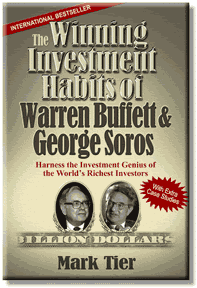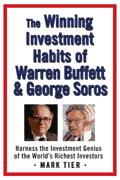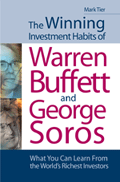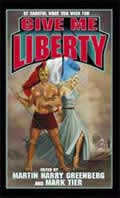
Now on Kindle! |
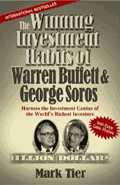 |
Available in Kindle format on Amazon.com, Amazon.co.uk, Amazon.de, Amazon.it, Amazon.es, and Amazon.fr |
Available in Kindle format on Amazon.com, Amazon.co.uk, Amazon.de, Amazon.it, Amazon.es, and Amazon.fr |
![]()
Mark Tier’s e-letter,
Investor’s Edge helps you apply the winning investment habits of
the world’s master investors.
Read the latest issue: How Much is Twitter "Worth"?
Index of issues
![]()
REV
UP your Investment IQ
Get a detailed report on your investment habits and strategies
... compared to those of Buffett, Icahn and Soros.
Discover
Your Investment Personality
Make more money by finding the investment style that fits your personality
best.
Do you commit any of the 7 Deadly Investment Sins... widely-held investment beliefs that are hazardous to your wealth. Beliefs that Master Investors like Buffett, Icahn and Soros emphatically do NOT share.
BONUS!
“My Favorite Wealth-Building
Secret”... ONE
of the 23 Winning Investment Habits of Warren Buffett & George Soros stands
out so much that if that’s the only one you adopt, you can kiss
the days of losing money in the markets goodbye forever. I
call it "My Favorite Wealth-Building
Secret" and if you’ve read The Winning Investment Habits of Warren Buffett & George Soros, I’d like you to have
this Special Report as a “thank you” from me.
![]()
Jobs
for Everyone
How minimum wages cause unemployment and welfare results
in misery
read
article >>
Bird Flu? Bird Schmoo!! Worried about the H5N1 bird flu virus causing a pandemic? The scientific evidence suggests the media scare that the H5N1 virus will cause a pandemic is mostly hype. Read on
A Society Without Goverment that Works? Where but in science fiction, the literature of the imagination, can we skim across the surface of black holes, dive into the sun, and journey to the beginning, the end, and the edge of the universe... And visit a society without government that works?...see my introduction to Visions of Liberty
The
Case of the “Reluctant” Virgin
At the age of 5, Soraya (not her real name) was circumcised, a common
practice for Muslim girls in the country of her birth
more >>
The
Liberation of the Chinese Woman — and the Chinese Entrepreneur
How
the free market freed women (and entrepreneurs) in Hong Kong more
>>

How
To Get A
Second Passport
Read the report that started
an industry — with some updated links to current information more
>>
Classic
Jokes
My collection of real humdingers — guaranteed to make you laugh.
![]()
The
latest issue of...
Mark Tier’s Investor’s
Edge
|
Black Swans,
Luck, Will your portfolio survive the next "Black
Swan": “Black Swans,” says Nassim Nicholas Taleb in his fascinating new book, The Black Swan: the Impact of the Highly Improbable, are rare events (that aren’t as rare as most of us think) that:
Being mentally wired as explanation-seeking creatures, having concocted our reassuring and rational story (which is usually more wishful thinking than fact), we humans retire to our comfortable cocoon where those devastating “statistically improbable” “long-tail” events are once-in-a-lifetime occurrences. They’re not, says Taleb. Worse, he says, they’re becoming more frequent. Consider Long-Term Capital Management. The group
of highly-intelligent PhD-holding quants at LTCM, as I wrote in
The
Winning Investment Habits of Warren Buffett & George Soros
Well...duh...“Dey wuz wrong.” LTCM didn’t even make it to its tenth birthday before it collapsed. What you probably don’t realize is that most other Wall Street institutions are using the same kind of statistically-based models as LTCM...which all have the same flaw: they don’t allow for “Black Swans.” And then there’s...the Crash of ’87, the rise of OPEC, the Asian currency crisis of 1997, the Russian meltdown of 1998 (which killed Long-Term Capital Management)...two “Black Swans” in a row!!...statistically impossible, 9/11, the incredible rise from a garage to dominance of Google, the NASDAQ implosion of 2000...and that’s not all the “Black Swans” that have happened over the last 30-odd years. Not exactly “once-in-a-lifetime” occurrences. Those investors who’ve lost billions, if not trillions of dollars in those and similar “Black Swans” usually put it down to “bad luck.” And if they’re not scared away from the markets altogether, go back to doing whatever they were doing before. Certainly, luck can play an important part in our lives. For example, a few weeks before the Crash of ’87 — another Black Swan — an obscure Wall Street investment analyst named Elaine Garzarelli predicted that a crash was imminent. After the crash she became an instant celebrity, and has been living off her “guru” status ever since. However, an examination of her subsequent track record suggests that her success is due more to luck than prescience. (For more on this, see “The Seven Deadly Investment Sins,” which is Chapter 2 of Winning Investment Habits. You can download it at www.inversebooks.com). The kind of luck most investors experience is, however, usually bad luck. Paradoxically, one of the worst things that can happen to a novice investor is be lucky, and make money on his or her first investment. Convinced they know what they’re doing, they go on to “repeat” their success — and lose their shirts. When the average investor makes money, he’ll often attribute his success to his “superior ability.” While his failures are usually the result of “bad luck.” An examination of “good luck” usually shows that it’s really the result of being in the right place at the right time, knowing what to look for, and being prepared to act instantly. One example of this mental preparation: George Soros was not the only currency trader to profit from the collapse of the pound sterling in 1992 — an event which was neither unpredictable nor unpredicted. He was, however, the only one who went home with $2 billion dollars in profits. The great investor structures her approach to eliminate luck — especially “bad” luck — from her investment method. And the impact of “Black Swans.” Indeed, I was struck by the similarity in Taleb’s approach with something Warren Buffett wrote in his 2006 Letter to Shareholders. Announcing the he planned to hire “a younger man or woman with the potential to manage a very large portfolio, who we hope will succeed me as Berkshire’s chief investment officer when the need for someone to do that arises,” Buffett continued:
These two paragraphs read (and note Buffett’s emphasis) as if they were quoted from Taleb’s book The Black Swan. Of course, they weren’t. Taleb’s book came after Buffett’s letter. And in any case, Buffett (like Soros) was avoiding “Black Swans” long before Taleb came up with his investment approach (based on profiting from “Black Swans”). Are you? That’s the important question. What’s going to happen to your investment portfolio when the next Black Swan hits. Are you going to lick your wounds (assuming they’re not fatal), put it down to “bad luck” (sorry, it’s bad planning). Or will you observe the next Black Swan as something that’s happening to other people, not you? I urge you to read Nassim Taleb’s The
Black Swan Or you’ll find a more “how-to” approach in The Winning Investment Habits of Warren Buffett & George Soros. And re-organize your investment approach to eliminate (or, at least, minimize) the likely effect of the next Black Swan on your wealth (and well-being). The problem with “Black Swans” is that they come out of the blue and take absolutely everyone by surprise. They’re only “predictable” with infallible “20/20 hindsight” — which will be a real source of comfort when you’ve gone from being a zillionaire on top of the world to scrounging for meals in the garbage cans in the alley-ways back of those five-star restaurants where you used to be a regular and honored customer. — Mark Tier Have
a question or a comment? Email it to investorsedge@marktier.com |
Dear Investor:
The purpose of my Investor’s Edge is to help you apply the winning investment habits of the world’s master investors.
Each issue has an article like the one at left, plus notes, comments, useful links and other things that come to my attention that I think would interest you.
It comes out only when I see something worth writing about — so there’s no fixed schedule. And this "unfixed" schedule has, I must admit, become very erratic recently.
If you'd like to receive future issues of “Investor’s Edge,” and notifications of other articles and items of interest, just sign up here:
By the way, we don’t give out your email address or any information about you to any third party.Here’s to more profitable investing!

